Happy Birthday, Ann Sheridan!
In Tinsel Town, she was known as “The Oomph Girl.” Ann Sheridan—born on this date in 1915—loathed the nickname. “Just being known by a nickname indicates that you’re not thought of as a true actress,” she reflected in later years. “If you call an actress by her looks or a reaction, then that’s all she will ever be thought of as.” Sheridan was understandably put out by the moniker that suggested she was little more than a pin-up girl (which, admittedly, she was in the early 1940s) instead of a versatile, intelligent performer vastly underrated by Hollywood. Ann was also resigned to the reality that being perceived in that fashion certainly didn’t hurt her career any: “I know if it hadn’t been for ‘oomph’ I’d probably still be in the chorus.”
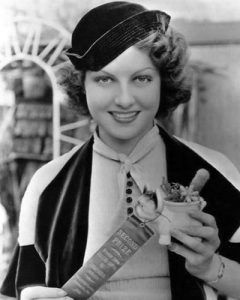 Denton, Texas was where Clara Lou Sheridan called home, the youngest of five children born to Lula Stewart and George W. Sheridan. Although she dabbled in high school dramatics, Sheridan’s ambition was to become a teacher—pursuing that field of study at North Texas State Teachers College. Her sister Kitty had other plans; she submitted Clara Lou’s photo to a “Search for Beauty” contest conducted by Paramount Pictures, with the prize being a screen test and a bit part in a 1934 film, Search for Beauty. The studio then signed Clara Lou to a contract at a starting salary of $75 a week. Sheridan appeared in several films, mostly in uncredited bit roles, but occasionally receiving billing in vehicles like Come On, Marines!, Kiss and Make-Up, and Ladies Should Listen (all released in 1934).
Denton, Texas was where Clara Lou Sheridan called home, the youngest of five children born to Lula Stewart and George W. Sheridan. Although she dabbled in high school dramatics, Sheridan’s ambition was to become a teacher—pursuing that field of study at North Texas State Teachers College. Her sister Kitty had other plans; she submitted Clara Lou’s photo to a “Search for Beauty” contest conducted by Paramount Pictures, with the prize being a screen test and a bit part in a 1934 film, Search for Beauty. The studio then signed Clara Lou to a contract at a starting salary of $75 a week. Sheridan appeared in several films, mostly in uncredited bit roles, but occasionally receiving billing in vehicles like Come On, Marines!, Kiss and Make-Up, and Ladies Should Listen (all released in 1934).
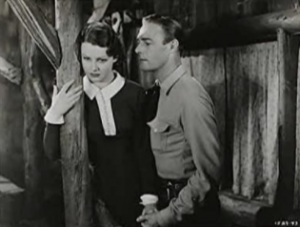 By the time Clara Lou Sheridan made Behold, My Wife! in 1934 she had changed her name to “Ann Sheridan,” inspired by a character she portrayed in the play The Milky Way. Behold turned out to be a good early showcase for Ann, getting positive notices (including a standout scene where her character commits suicide). Although Sheridan continued to do solid work in features like Car 99, Rocky Mountain Mystery, and The Glass Key (all 1935), Paramount chose not to renew her contract after loaning her to Poverty Row studio Talisman for The Red Blood of Courage (1935). Ann then appeared in Fighting Youth (1935) for Universal and signed a contract with Warner Bros. the following year.
By the time Clara Lou Sheridan made Behold, My Wife! in 1934 she had changed her name to “Ann Sheridan,” inspired by a character she portrayed in the play The Milky Way. Behold turned out to be a good early showcase for Ann, getting positive notices (including a standout scene where her character commits suicide). Although Sheridan continued to do solid work in features like Car 99, Rocky Mountain Mystery, and The Glass Key (all 1935), Paramount chose not to renew her contract after loaning her to Poverty Row studio Talisman for The Red Blood of Courage (1935). Ann then appeared in Fighting Youth (1935) for Universal and signed a contract with Warner Bros. the following year.
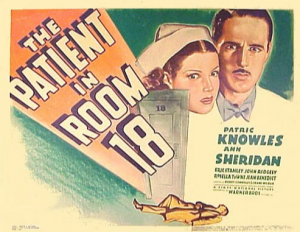 Ann Sheridan was signed to Warner’s to appear in musicals but found a niche in the studio’s hard-hitting “social” dramas. She did three with Humphrey Bogart: Black Legion (1936), The Great O’Malley (1937), and San Quentin (1937). (The last picture cast them as brother and sister, so offscreen they jokingly referred to one another as “Brother Bogie” and “Sister Annie.”) Ann also graced many a Warner’s B-picture: Alcatraz Island (1937), The Patient in Room 318 (1938), and Mystery House (1938), to name a few. A loan-out to Universal for Letter of Introduction (1938; featuring Edgar Bergen & Charlie McCarthy) resulted in such favorable notices that the Warner’s brass cast her alongside James Cagney in Angels with Dirty Faces (1938). This motion picture classic reunited her with her fellow O’Malley/San Quentin players Bogart and Pat O’Brien and was the first of three films she’d appear in with the “Dead End” Kids (the other two were 1939’s They Made Me a Criminal and The Angels Wash Their Faces).
Ann Sheridan was signed to Warner’s to appear in musicals but found a niche in the studio’s hard-hitting “social” dramas. She did three with Humphrey Bogart: Black Legion (1936), The Great O’Malley (1937), and San Quentin (1937). (The last picture cast them as brother and sister, so offscreen they jokingly referred to one another as “Brother Bogie” and “Sister Annie.”) Ann also graced many a Warner’s B-picture: Alcatraz Island (1937), The Patient in Room 318 (1938), and Mystery House (1938), to name a few. A loan-out to Universal for Letter of Introduction (1938; featuring Edgar Bergen & Charlie McCarthy) resulted in such favorable notices that the Warner’s brass cast her alongside James Cagney in Angels with Dirty Faces (1938). This motion picture classic reunited her with her fellow O’Malley/San Quentin players Bogart and Pat O’Brien and was the first of three films she’d appear in with the “Dead End” Kids (the other two were 1939’s They Made Me a Criminal and The Angels Wash Their Faces).
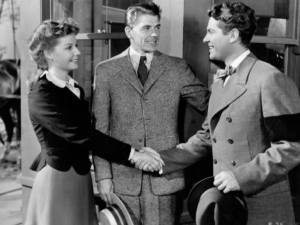 There would be more Ann Sheridan-James Cagney pictures to follow (1940’s Torrid Zone and City for Conquest) as well as Bogie (They Drive by Night and It All Came True, both 1940), and Sheridan had fond memories of working alongside Errol Flynn in Dodge City (1939) and Edge of Darkness (1943). Ann got star billing in 1941’s Kings Row and while her performance—one of the finest of her career—was singled out by the National Board of Review, she failed to get an Oscar nomination. In fact, she was repeatedly snubbed by the Academy Awards during her time in Hollywood.
There would be more Ann Sheridan-James Cagney pictures to follow (1940’s Torrid Zone and City for Conquest) as well as Bogie (They Drive by Night and It All Came True, both 1940), and Sheridan had fond memories of working alongside Errol Flynn in Dodge City (1939) and Edge of Darkness (1943). Ann got star billing in 1941’s Kings Row and while her performance—one of the finest of her career—was singled out by the National Board of Review, she failed to get an Oscar nomination. In fact, she was repeatedly snubbed by the Academy Awards during her time in Hollywood.
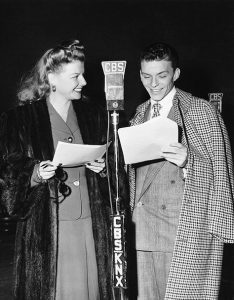 Ann Sheridan didn’t do a lot of radio: as she explained on an August 19, 1945 broadcast of Songs by Morton Downey, she often suffered from “mike fright.” Sheridan did guest on such series as The Bill Stern Colgate Sports Newsreel, Command Performance, The Gulf/Lady Esther Screen Guild Theatre, Mail Call, and The Smiths of Hollywood. In addition, funsters like Eddie Cantor, George Burns & Gracie Allen, Dean Martin & Jerry Lewis, and Jack Benny requested Ann’s presence on their programs—Jack even made a picture with Ann, George Washington Slept Here (1942).
Ann Sheridan didn’t do a lot of radio: as she explained on an August 19, 1945 broadcast of Songs by Morton Downey, she often suffered from “mike fright.” Sheridan did guest on such series as The Bill Stern Colgate Sports Newsreel, Command Performance, The Gulf/Lady Esther Screen Guild Theatre, Mail Call, and The Smiths of Hollywood. In addition, funsters like Eddie Cantor, George Burns & Gracie Allen, Dean Martin & Jerry Lewis, and Jack Benny requested Ann’s presence on their programs—Jack even made a picture with Ann, George Washington Slept Here (1942).
Back at Warner Bros., Ann Sheridan co-starred with Dennis Morgan and Jack Carson in features like Wings for the Eagle (1942) and Shine on Harvest Moon (1944); the trio also comprised the all-star Warner’s cast in Thank Your Lucky Stars (1943), where Ann sang Love Isn’t Born (It’s Made). Sheridan, Morgan, and Carson would team up for one final Warner’s film, One More Tomorrow (1946), but the actress’ post-War successes fell short of her earlier popularity. She went out on a high note at the studio with Nora Prentiss (1947), The Unfaithful (1947), and Silver River (1948; her last feature film with Errol Flynn). Borrowed by director Leo McCarey for 1948’s Good Sam, Sheridan became a freelancer in such features as the classic screwball comedy I Was a Male War Bride (1949) and the recently restored noir Woman on the Run (1950, which she also produced).
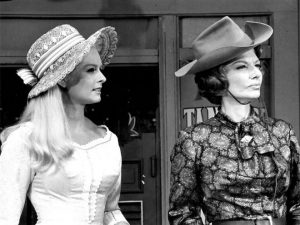 Woman on the Run would be released by Universal, who signed Ann Sheridan to a contract and cast her in movies like Just Across the Street (1952) and Take Me to Town (1953). One of her last features was made at Republic: Come Next Spring (1956), recently showcased on Turner Classic Movies. Ann gradually faded from the silver screen and began doing small screen (TV) work like Playhouse 90 and Wagon Train. A brief relocation to New York gave Sheridan opportunities for stage work and a role on the daytime drama Another World. Her last work on television was starring on the comedy-Western Pistols ‘n’ Petticoats; Ann was clearly ill while working on the series, and she succumbed to esophageal cancer at the age of 51 in 1967.
Woman on the Run would be released by Universal, who signed Ann Sheridan to a contract and cast her in movies like Just Across the Street (1952) and Take Me to Town (1953). One of her last features was made at Republic: Come Next Spring (1956), recently showcased on Turner Classic Movies. Ann gradually faded from the silver screen and began doing small screen (TV) work like Playhouse 90 and Wagon Train. A brief relocation to New York gave Sheridan opportunities for stage work and a role on the daytime drama Another World. Her last work on television was starring on the comedy-Western Pistols ‘n’ Petticoats; Ann was clearly ill while working on the series, and she succumbed to esophageal cancer at the age of 51 in 1967.
 I mentioned earlier in this essay that today’s birthday girl had once joked and joshed with the likes of George Burns & Gracie Allen; you can find that September 28, 1943 broadcast on Treasury, available in our digital downloads store. But you can also check out Ann on the 2-CD set The Westerns: Music and Songs From Classic Westerns, featuring toe-tapping ditties from cinematic sagebrush sagas. Sheridan’s rendition of Marching Through Georgia/Dixie from Dodge City (1939) is just one of the many highlights.
I mentioned earlier in this essay that today’s birthday girl had once joked and joshed with the likes of George Burns & Gracie Allen; you can find that September 28, 1943 broadcast on Treasury, available in our digital downloads store. But you can also check out Ann on the 2-CD set The Westerns: Music and Songs From Classic Westerns, featuring toe-tapping ditties from cinematic sagebrush sagas. Sheridan’s rendition of Marching Through Georgia/Dixie from Dodge City (1939) is just one of the many highlights.



Ann had a feisty personality that worked for most of her characters and makes her a friend to fans as well as a star. Gotta get that western CD.